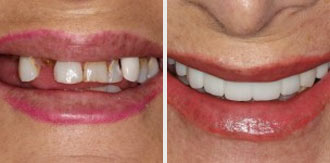Post-Treatment
After Surgery
Please make it a point to read and follow all instructions given to you. Even though you may not initially feel uncomfortable, swelling and its resulting complications can be kept to a minimum for the week following oral surgery.
These instructions are important!
Immediately following the surgery, gently apply ice packs for periods of approximately twenty minutes on and ten minutes off, or keep ice on the outside of the mouth until it is cold and remove the ice pack for a short time before reapplying the ice. This procedure should be continued all day. Your diet should consist of soft foods (example: oatmeal, cottage cheese, cooked rice, chicken, soups) nothing hard, sharp or spicy. Do not rinse or use mouthwash with alcohol for twenty-four hours. If your mouth is dry or has a bad taste, you may wipe your tongue with a wet cloth. A small amount of bleeding is to be expected and can be reduced by applying pressure to the surgical area with folded gauze provided to you, a moist tea bag or a wet wash cloth. Excessive bleeding should be reported at once.
At about forty-eight hours after surgery, you may notice some swelling of the surgical site, accompanied by mild discomfort. You may elect to manage the discomfort with Tylenol or Advil. Excessive swelling or severe pain should be reported.
Other Important Instructions:
Since a clean mouth heals faster, you may carefully use a soft toothbrush the day after surgery in the areas of the mouth not involved with the surgical procedure. At this time you should also begin rinsing very gently with a warm saltwater solution (one half tablespoon of salt in eight ounces of warm water) three times a day.
Do not smoke or drink alcohol for seven days following surgery. Do not drink through a straw or pick at the surgical area. Do not use aspirin for 24 hours following oral surgery. Avoid excessive activity such as running and aerobic exercise for the first few days. Do not use denture adhesives until otherwise instructed by the doctor.
Pulling your lip out to inspect the surgical area may loosen or tear your stitches. Please use caution. Unless there is a need, it is best to leave the area undisturbed.
Discomfort following dental procedures can be expected. If medication has been given or prescribed, take it as you were instructed by the doctor.
Medication Instructions
Antibiotics: enclosed, please find a prescription for antibiotics (i.e. Amoxicillin, Pen VK, Erythromycin, Clindamycin, Keflex, etc.) that you need to begin taking one day prior to treatment, and continue for 2 days as indicated.
Anti-inflammatory: enclosed, please find a prescription for Ibuprofen 600mg every 6 hours and begin taking evening before surgery, and continue for 2 additional days as needed.
Pain Medication: Analgesics (i.e. Norco, Tylenol #3): will be prescribed on an “as needed” basis for discomfort. If you find that the medication is too strong, you may use an over-the-counter medication such as Extra Strength Tylenol instead.
Do not exceed the recommended dose of your pain medication. If you are having excessive pain, contact his office. If you feel you may be having an adverse reaction to any medication given or prescribed, discontinue it at once and contact this office immediately. Never consume alcohol with prescription or non-prescription medications. Please inform us of any other medications you are currently taking, or health conditions for which you are currently being treated.
Blood Thinners/Hypertension Medication: please advise us of any of these medications that you may be taking, as this may lead to prolonged bleeding.
* Patients who are routinely premedicated for dental procedures due to heart murmurs (MVP), artificial joints or valves should follow their standard premedication regimen, as discussed.
Please don’t hesitate to call us for any further needs at 248-646-8651
Types of Medicine you may be given
Antibiotics (i.e. Pen-VK®, Erythromycin®, Keflex®, etc.) When prescribed, always finish the entire prescription as directed.
Analgesics (i.e. Norco and Tylenol #3) Take as directed as needed for pain. This medication is optional, but we recommend you take the first two doses (as indicated above) in order to prevent the onset of anything greater than mild to moderate discomfort. If you find that the medication is too strong, you may cut the tablet in half, or use an aspirin-free, over-the-counter pain reliever such as Tylenol® instead. Do not use aspirin-containing pain relievers for the first twenty-four hours after surgery, as they may delay clotting time and therefore, contribute to prolonged bleeding.
If you have any questions concerning the procedure please contact Dr. Kosinski or one of the staff. The staff is very well educated and can answer most questions. If they cannot Dr. Kosinski will come to the phone or set up a time for you to discuss your concerns. The office phone is 248-646-8651, the e mail address is allquestions@smilecreator.net.

